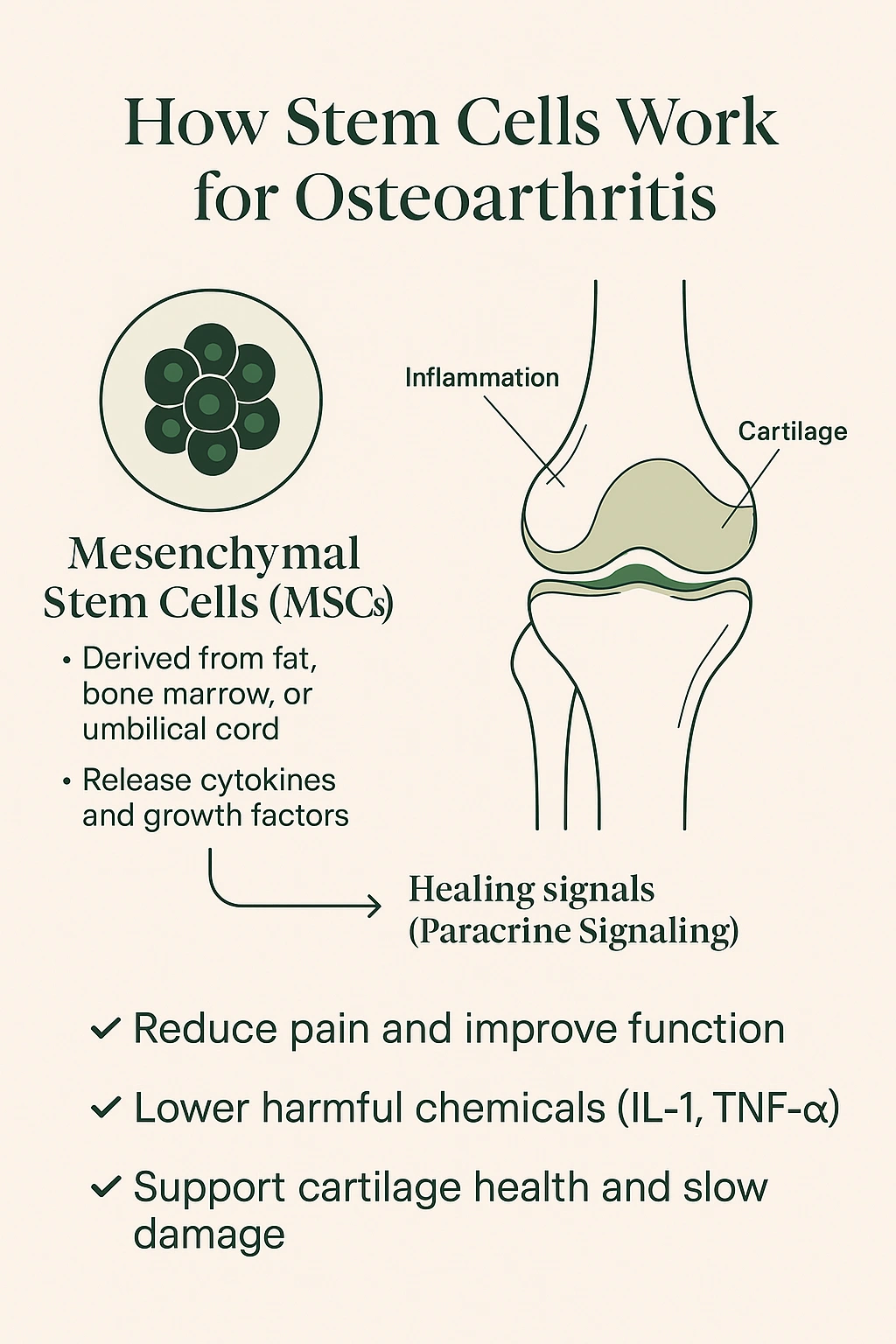Stem Cell Therapy is a promising option for managing arthritis, offering relief and potential regeneration of damaged cartilage. But how does it work, and is it the right choice for you?
If you’re considering Stem Cell Therapy, our team can guide you in deciding if it’s the right fit, help you choose the best clinic & region, and even assist you in securing some great discounts! Fill in our form here to set up a conversation.
What Is Osteoarthritis?
Osteoarthritis affects millions of people worldwide, causing joint pain, stiffness and reduced mobility. It occurs when cartilage, the cushion between your joints, breaks down, leading to bone-on-bone friction. This makes even everyday movements painful.
Traditional treatments like painkillers and physical therapy only manage symptoms. Stem Cell Therapy, however, aims to address the root cause by regenerating cartilage and reducing inflammation.
How Does Stem Cell Therapy Work for Arthritis?
Looking at the actual research, stem cell therapy for osteoarthritis works by reducing inflammation and sending healing signals that improve joint health rather than differentiation.
Mesenchymal stem cells (MSCs), whether derived from fat, bone marrow, or umbilical cord, release bioactive molecules called cytokines and growth factors. These signals calm the immune system and create a healthier joint environment that supports tissue repair.
Research shows that while MRI scans rarely confirm full cartilage regrowth, stem cells can help keep cartilage healthy, slow down further joint damage and reduce symptoms. Clinical studies report improvements in pain scores, joint function and mobility, often within a few months of treatment.
This effect comes mainly from paracrine signaling, where stem cells act like “cellular pharmacies” by releasing molecules that support repair, rather than turning into new cartilage cells (a process called differentiation). They also lower harmful chemicals such as IL-1 and TNF-α, linked to pain and cartilage breakdown. The can also encourage nearby cells in the joint to heal. In advanced trials like Cartistem, tissue biopsies even showed cartilage resembling healthy hyaline cartilage, suggesting stem cells can drive the body’s natural repair processes effectively.
If you’re looking at Stem Cell Clinics abroad, the biggest risk your taking is going to a clinic following poor standards. That’s why we take our vetting process so seriously. Read more about our process & why we do what we do below


How Much Does Stem Cell Therapy for Arthritis Cost?
Globally, stem cell therapy for arthritis typically costs $3,500 to $15,000 per joint, depending on the country, clinic type, and cell source. Here’s a breakdown by region:
Living with arthritis means daily pain, stiffness. We’re not selling you the dream of stem cells definitely curing arthritis. We’re here to help you understand the treatment options honestly, understand the risks involved & treatment prices around the world.
Get Free GuidanceNo pressure. No spam. Just honest advice to help choose the right clinic.
Does Stem Cell Therapy Work for Arthritis?
Yes, Stem Cell Therapy can work for arthritis, especially for osteoarthritis. Clinical studies show improvements in joint function, pain reduction and in some cases, cartilage regeneration. However, results vary depending on factors like the severity of the arthritis and the patient’s overall health.
To read more about how Stem Cell Therapy works, we’ve put together a full guide for you. Check out What is Stem Cell Therapy!
What are the Success Rates for Stem Cells treating Arthritis in 2026?
Research shows that stem cell therapy for arthritis improves pain and function in most patients, with success rates typically ranging from 60% to 90% depending on the study.
Overall, studies consistently find that patients feel less pain, move more easily, and experience slower joint damage after treatment.
While it rarely rebuilds cartilage completely, stem cell therapy helps create a healthier joint environment and reduces inflammation, which is why symptoms improve.
Results vary from person to person, but most research supports it as a safe option that can meaningfully improve quality of life for people with arthritis.
However in real life, we can’t say the success rates will be the same as clinics will be using different preparation methods, dosages etc so take this into consideration!
Here at Alt Treatment, we’re collecting data on real treatment results across clinics in multiple countries, so talk to us here if you want to see what results are happening in real life clinic settings.
Top Stem Cell Therapy Clinics for Osteoarthritis
We don’t let any clinic just sign up or pay to be listed.
We speak to every clinic directly and review their medical team, the treatments they offer, how their stem cells are sourced and how they follow up with patients after treatment.

We also review licensing documents to confirm they meet the legal and medical standards of the country they operate in. For example, whether cells are processed in a GMP-certified facility or if they provide documentation on stem cell quality.

Clinics must also agree to let us collect and publish independent patient reviews. Both positive and negative.

Why Use Alt Treatment?
We don’t just list clinics, we help you choose the right one, get the best pricing and support you through the entire journey. For free.
Compare with Confidence: Get clinic matches based on your condition, location, and budget.
Ask the Right Questions: Know what to ask before committing
Save on Treatment: Unlock exclusive discounts on vetted clinics and follow-up care.
We’re With You After Treatment: We check in post-treatment and help resolve any issues.
Travel & Visa Help: Need to travel for care? We can help with logistics, documents, and local tips.
Found a Clinic Elsewhere? We’ll check their licensing and track record for you, free of charge.
No Strings Attached: Even if you choose a clinic we don’t partner with, we’re still here to help you make the best decision.
Top Stem Cell Therapy Clinics for Osteoarthritis
We’ve vetted Stem Cell Therapy clinics Globally who treat Osteoarthritis. Information on their processes, standards they follow & prices are on their profiles.
Compare Clinics GloballyApproved Osteoarthritis Stem Cell Treatments in 2026
Currently, there are two approved Stem Cell Treatments globally for Osteoarthritis, Cartistem & Stempeucel.
Cartistem (South Korea)
Cartistem is an umbilical cord–derived stem cell therapy approved in South Korea for knee osteoarthritis. It’s designed to repair damaged cartilage and improve joint function, offering a regenerative option for patients who haven’t responded to conventional care.
We have more details on it in our Knee Treatment article & we’re working with a couple of clinics who offer Cartistem.
Stempeucel / StemOne (India)
Stempeucel is a bone marrow–derived stem cell therapy approved in India for knee osteoarthritis. It helps reduce pain and inflammation while supporting cartilage health, giving patients access to an innovative treatment backed by local regulatory approval.
2026 Research Updates on Arthritis
A Phase II study from South Korea tested autologous adipose-derived stem cells in people with knee osteoarthritis. Patients who received a single injection showed a 55% drop in symptoms, less pain on VAS scores, and better movement within six months. MRI scans confirmed the treatment helped stop cartilage from worsening, and no serious side effects were reported. You can read more about it on Stem Cell Journals.
Another study from Pakistan looked at 50 people with osteoarthritis or bone defects who received stem cell injections using cells from their own fat or bone marrow. After six months, pain scores and joint function improved significantly, although 28% of patients reported mild side effects and 8% had serious adverse events. Researchers concluded stem cells reduced inflammation and supported tissue repair through their regenerative properties. You can read more about it on its published page on Pubmed.
To read more about more studies and current trials looking at Stem Cells treating Arthritis, check out our research page on Osteoarthritis
The Upsides and Risks of Stem Cell Treatment for Arthritis
The Upsides:
- Natural Healing: Encourages the body to repair itself rather than just masking pain.
- Avoids Surgery: A less invasive alternative to joint replacement surgery.
- Lasting Relief: Many patients report long-term improvements
Risks of getting Stem Cells for Arthritis:
- High Cost: Treatments can be expensive and most aren’t covered by insurance.
- Mixed Results: While many see improvements, not everyone responds the same way.
- Still Experimental: Long-term outcomes are still being studied.
How Does Stem Cell Therapy Compare to Other Treatments for Arthritis?
Want to explore stem cell clinics that treat arthritis?
We’ve verified trusted clinics in Colombia, Japan & the UAE, and more. So you don’t waste time comparing clinics that aren’t legitimate.
Browse Verified Stem Cell Clinics| Treatment | Invasiveness | Effectiveness | Cost |
| Stem Cell Therapy | Low | Promising (60-90%) | $3,500–$15,000 |
| Joint Replacement Surgery | High | Permanent (90%) | $20,000–$50,000 |
| PRP Therapy | Low | Moderate (50–60%) | $500–$2,000 |
| PainKillers | None | Symptom management | Varies |
Is Stem Cell Therapy for Arthritis Worth It?
Stem Cell Therapy can definitely be worth it for some, especially those with osteoarthritis who want to avoid surgery. Studies show real potential in reducing pain, improving joint function and even regenerating cartilage.
That said, it’s not a guaranteed fix.
If you’re curious about stem cells treating other conditions, our article on What conditions Can Stem Cell Therapy treat might be an interesting read. Or check out our Areas of Treatment section!
If you’re deciding which country is best for you, or want to talk about clinics we’ve already vetted, fill out our form below. Our team will guide you with clear, honest answers.
Alt Treatment is a free, independent platform that helps you understand stem cell therapy & decide if it’s right for you.
We break down complex information into clear, honest guidance. When you’re ready, we can connect you with verified clinics that meet your needs, in the right location, and often with exclusive discounts.
There’s no charge to use our platform. No hidden fees. No pressure. Our main aim is to genuinely help you figure out if treatment is right & the best places to consider.
If you want to talk, fill out our form here & our personal concierge team will reach out.
Most insurance providers don’t cover it yet, but some clinics offer financing options to help with costs.
Japan, Colombia, South Korea, & Thailand are amongst the countries you can get Stem Cell treatments for Osteoarthritis in. To view clinics globally that can Osteoarthritis, you can compare them all here.
Fill in your details below
For a discounted offer for Stem Cell Therapy!

